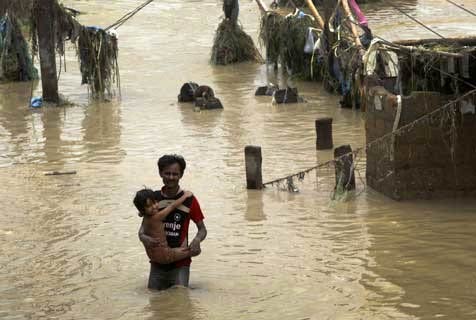Pakistan flood: many more will die unless more aid is delivered quickly
Posted on 23 August 2010 by John Cook
When you immerse yourself in the climate debate, it's easy to get lost in the peer-reviewed papers, data and science. But I try not to lose sight of the fact that the reason I care about climate change is because of its impact on humanity. Right now, people are being affected by extreme weather events such as the Pakistan flood which has rendered 20 million homeless by the "slow-motion tsunami". While a few thousand died due to the floods, many more people will die from disease and malnutrition unless more aid is delivered quickly. It's crucial right now that people send donations to relief efforts.

To get an appreciation of the magnitude of the disaster in Pakistan, check out this NY Times article, Flood Disaster May Require Largest Aid Effort in Modern History. Here are some excerpts:
Experts say initial assessments show the scale of damage and human suffering left by torrential monsoon rains over the past three weeks dwarfs the 2004 Indian Ocean tsunami, 2005 Kashmir earthquake, 2008 Cyclone Nargis disaster in Burma, and Jan. 12 earthquake in Haiti -- combined.
"A food crisis is also possible if food assistance is not reached soon enough," warned Martin Mogwanja, the United Nations' chief humanitarian relief coordinator in Pakistan. "And if [aid is] not provided soon enough, there could be a second wave of death caused by waterborne diseases such as gastroenteritis and acute waterborne disease," he told reporters in a teleconference yesterday
Officials say about 800,000 to 900,000 homes have been destroyed or made unlivable. The government believes 4.6 million have been left homeless in just two provinces, Punjab and Sindh.
Pakistan's agricultural economy, the source of income for about 70 percent of the population, has borne the brunt of the damage. "This is where we have been hit the most," said Qureshi.
More than 17 million acres of farmland was inundated, Qureshi said. U.N. officials figure that more than 200,000 head of livestock have been killed in the flooding. And the nation's cotton crop, an important source of export earnings, has largely been wiped out after 1 million acres of the crop was lost to floods in Punjab.
So I exhort everyone to donate to help the relief effort. Here in Australia, we usually donate to Australian Red Cross - for U.S. readers, there's always the American Red Cross and elsewhere, the International Committee of the Red Cross. Americans can also check the US State Department’s page for contributions.































 Arguments
Arguments























 0
0  0
0






Comments